Ancient Greece
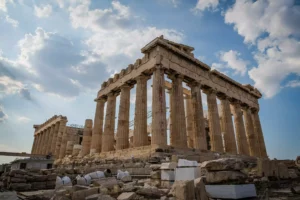
Ancient Greece (Greek: Ἑλλάς, romanized: Hellás) was a northeastern Mediterranean civilization, existing from the Greek Middle Ages of the 12th–9th centuries BC. to the end of classical antiquity (c. 600 AD), comprising a loose collection of culturally and linguistically related city-states and other territories, unified only once, for 13 years, under Alexander's empire Great (336-323 BC). In Western history, the era of classical antiquity was immediately followed by the High Middle Ages and the Byzantine period.
About three centuries after the Late Bronze Age collapse of Mycenaean Greece, Greek urban poleis began to form in the 8th century BC. C., marking the beginning of the archaic period and the colonization of the Mediterranean basin. This was followed by the era of classical Greece, from the Greco-Persian wars to the 5th and 4th centuries BC. C. The conquests of Alexander the Great of Macedon spread the Hellenistic civilization from the western Mediterranean to Central Asia. The Hellenistic period ended with the conquest of the eastern Mediterranean world by the Roman Republic and the annexation of the Roman province of Macedonia to Roman Greece, and later the province of Achaia during the Roman Empire.
Geographic location
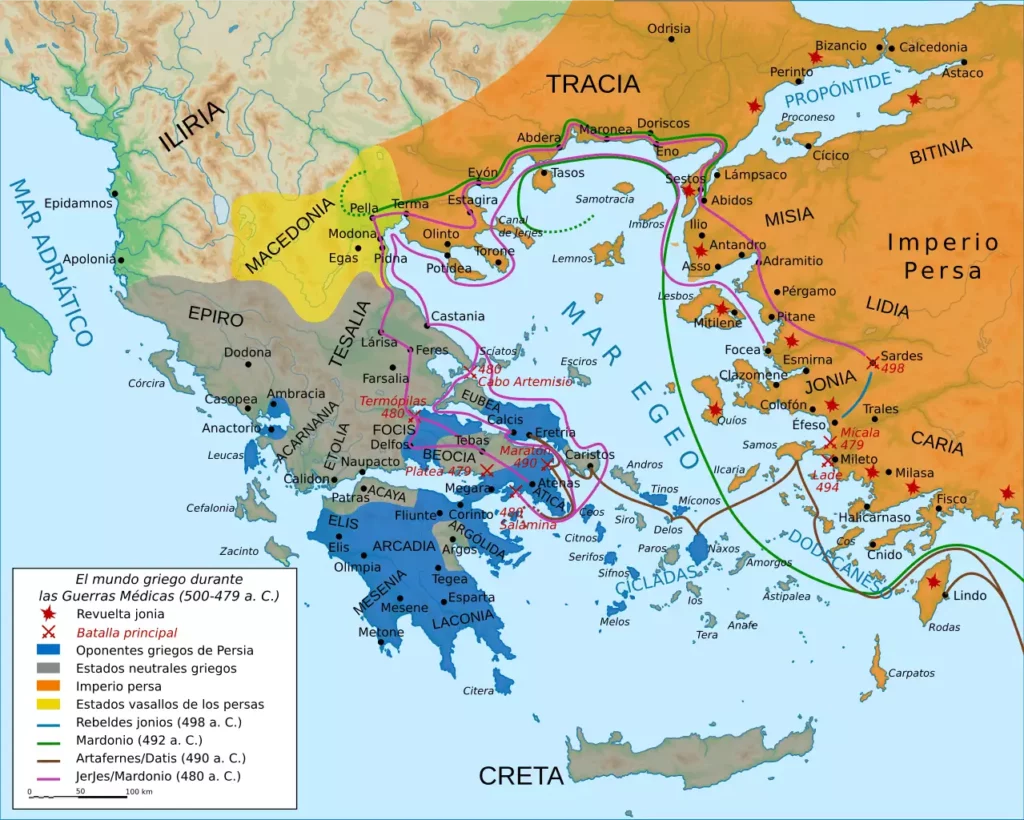
The territory of Greece is mountainous, and as a result, ancient Greece consisted of many smaller regions, each with its own dialect, cultural peculiarities, and identity. Regionalism and regional conflicts were prominent features of ancient Greece. Cities tended to be located in valleys between mountains, or on coastal plains, and dominated a certain area around them.
In the south is the Peloponnese, which consists of the regions of Laconia (southeast), Messenia (southwest), Elis (west), Achaia (north), Korinthia (northeast), Argolis (east), and Arcadia (center). These names survive to this day as regional units of modern Greece, albeit with somewhat different boundaries. Mainland Greece to the north, today known as Central Greece, consisted of Aetolia and Acarnania in the west, Locris, Doris, and Phocis in the center, while Boeotia, Attica, and Megaris were in the east. To the northeast was Thessaly, while Epirus was to the northwest. Epirus stretched from the Gulf of Ambracia in the south to the Ceraunian Mountains and the Aoos River in the north, and consisted of Chaonia (north), Molossia (center), and Thesprotia (south). In the northeast corner was Macedonia, it originally consisted of Lower Macedonia and its regions, such as Elimeia, Pieria, and Orestis. Around the time of Alexander I of Macedon, the Argead kings of Macedon began to expand into Upper Macedonia, lands inhabited by independent Macedonian tribes such as the Lyncestae, Orestae, and Elimiotae, and west beyond the Axius River into Eordaia, Bottiaea., Mygdonia and Almopia, regions populated by Thracian tribes. To the north of Macedonia were various non-Greek peoples, such as the Paeonians to the north, the Thracians to the northeast, and the Illyrians, with whom the Macedonians were frequently in conflict, to the northwest.
Chalkidiki was settled early on by Greek settlers from the south and was considered part of the Greek world, while from the late 2nd millennium BC there was also substantial Greek settlement on the eastern shores of the Aegean in Anatolia.
Culture
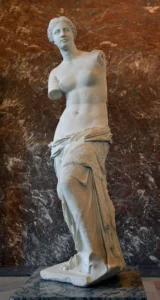
Classical Greek culture, especially philosophy, had a powerful influence on ancient Rome, which carried a version of it throughout the Mediterranean and much of Europe. For this reason, classical Greece is generally considered the cradle of Western civilization, the seminal culture from which the modern West derives many of its fundamental archetypes and ideas in politics, philosophy, science, and art.
Ancient Greek philosophy focused on the role of reason and investigation. In many ways, he had an important influence on modern philosophy, as well as modern science. Clear and unbroken lines of influence run from ancient Greek and Hellenistic philosophers, to medieval Muslim philosophers and Islamic scientists, to the European Renaissance and Enlightenment, to the secular sciences of modern times.
Neither reason nor investigation began with the ancient Greeks. Defining the difference between the Greek quest for knowledge and the quests of older civilizations, such as the ancient Egyptians and Babylonians, has long been a topic of study by civilization theorists.
The earliest known philosophers of Greece were the Presocratics, who attempted to provide naturalistic rather than mythical descriptions of the world. They were followed by Socrates, one of the first philosophers to settle in Athens during its golden age whose ideas, despite being known from second-hand accounts rather than his own writings, laid the foundation for Western philosophy. Socrates' disciple, Plato, who wrote The Republic and made a radical difference between ideas and the concrete world, and Plato's disciple Aristotle, who wrote extensively on nature and ethics, are also immensely influential in Western philosophy to this day. Later Hellenistic philosophy, also originating in Greece, is defined by names such as Antisthenes (Cynicism), Zeno of Citium (Stoicism), and Plotinus (Neoplatonism).
Characteristics
The oldest Greek literature was poetry and it was composed for performance rather than private consumption. The earliest known Greek poet is Homer, although he was certainly part of an existing tradition of oral poetry. Homer's poetry, although it developed at about the same time that the Greeks developed writing, would have been composed orally; the first poet who undoubtedly set his work in writing was Archilochus, a lyric poet of the mid-seventh century BC. Tragedy developed around the end of the archaic period, taking elements from the pre-existing genres of late archaic poetry.
Around the beginning of the classical period, comedy began to develop: the earliest date associated with the genre is 486 BC. C., when a comedy competition became an official event in the Dionysia City in Athens, although the earliest surviving ancient comedy is Aristophanes' Acharnians., produced in 425. Like poetry, Greek prose had its origins in the archaic period, with the first writers of Greek philosophy, history, and medical literature dating from the 6th century BC. Prose first emerged as the style of writing adopted by the pre-Socratic philosophers Anaximander and Anaximenes, although Thales of Miletus, considered the first Greek philosopher, apparently wrote nothing. Prose as a genre reached maturity in the classical era, and the main genres of Greek prose (philosophy, history,
Villages
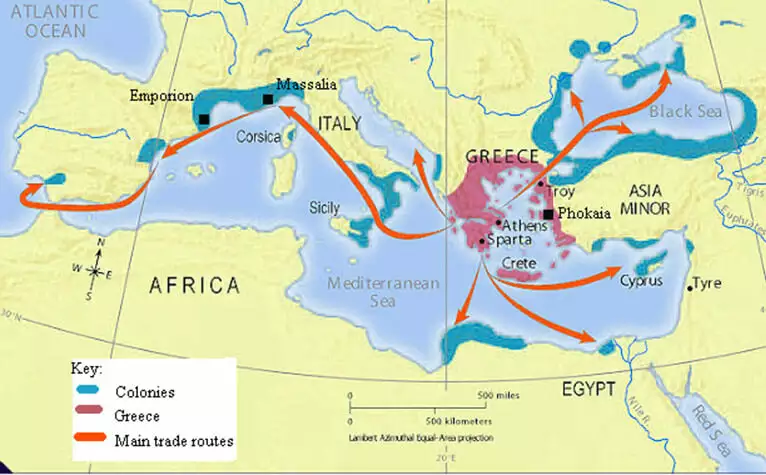
During the Archaic period, the Greek population grew beyond the capacity of the limited arable land of Greece proper, resulting in the large-scale establishment of colonies elsewhere: according to one estimate, the population of the expanding area of the Greek settlement increased approximately tenfold from 800 B.C. C. to 400 a. C., from 800,000 to 7½-10 million.
From about 750 B.C. C., the Greeks began 250 years of expansion, establishing colonies in all directions. To the east, the Aegean coast of Asia Minor was settled first, followed by Cyprus and the coasts of Thrace, the Sea of Marmara, and the southern coast of the Black Sea.
Ultimately, Greek colonization reached as far northeast as present-day Ukraine and Russia (Taganrog). To the west settled the coasts of Illyria, Sicily, and southern Italy, followed by southern France, Corsica, and even eastern Spain. Greek colonies were also founded in Egypt and Libya.
Modern Syracuse, Naples, Marseille, and Istanbul had their beginnings as the Greek colonies Syracuse (Συράκουσαι), Neapolis (Νεάπολις), Massalia (Μασσαλία), and Byzantium (Βυζάντιον). These colonies played an important role in spreading Greek influence throughout Europe and also helped establish long-distance trade networks between Greek city-states, which boosted the economy of ancient Greece.
Kingdom of Mycenae
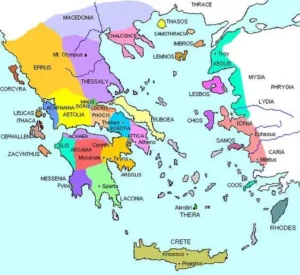
(c. 1600–c. 1100 BC)
Mycenaean Greece (or the Mycenaean civilization) was the last phase of the Bronze Age in ancient Greece, covering the period from about 1600-1100 BC. It represents the first distinctively advanced Greek civilization in mainland Greece with its palace estates, urban organization, artwork, and writing system. The most outstanding site was Mycenae, in the Argolis, which gives its name to the culture of this era. Other centers of power that emerged included Pylos, Tiryns, Midea in the Peloponnese, Orchomenos, Thebes, Athens in Central Greece, and Iolcos in Thessaly. Mycenaean and Mycenaean-influenced settlements also appeared in Epirus, Macedonia, on the Aegean islands, off the coast of Asia Minor, the Levant, Cyprus, and Italy.
Kingdom of Macedonia/Macedonian Empire
(808-146 BC)
Macedon (/ˌmæsɪˈdoʊniə/ (About this sound); Ancient Greek: Μακεδονία), also called Macedon (/ˈmæsɪdɒn/), was an ancient kingdom on the periphery of Archaic and Classical Greece, and later the dominant state of Ancient Greece. hellenistic. The kingdom was initially founded and ruled by the royal Argead dynasty, which was followed by the Antipatrid and Antigonid dynasties. Home to the ancient Macedonians, the oldest kingdom was centered in the northeastern part of the Greek peninsula and bordered Epirus to the west, Paeonia to the north, Thrace to the east, and Thessaly to the south. At the death of Alexander the Great in 323 a. C., the Macedonian Empire was the largest political entity in the world, encompassing all of Greece, Anatolia, Egypt, Mesopotamia, and Persia.
Kingdom of Cyrene
(632–30 BC)
Cyrenaica was colonized by the Greeks from the 7th century BC. C., when it was known as Kyrenaika. The first and most important colony was that of Cirene, established around the year 631 a. C. by settlers from the Greek island of Thera, who had left due to severe famine. His commander, Aristotle, took the Libyan name of Battos. His dynasty, the Battaids, persisted despite severe conflict with the Greeks in neighboring cities.
delian league
(or Athenian Empire) (478–404 BC)
The Delian League, founded in 478 BC. C., was an association of Greek city-states, with a number of members ranging between 150 and 330 under the leadership of Athens, whose purpose was to continue fighting against the Persian Empire after the Greek victory in the Battle. of Plataea at the end of the Second Persian invasion of Greece.
Kingdom of Bosphorus
(438 BC-370 AD)
The Bosphorus Kingdom, also known as the Cimmerian Bosphorus Kingdom (Greek: Βασίλειον τοῦ Κιμμερικοῦ Βοσπόρου, Basileion tou Kimmerikou Bosporou), was an ancient Greco-Scythian state located on the eastern shores of the Crimea and the Taman Peninsula. Taman Peninsula, on the shores of the Taman Peninsula. the current Kerch Strait. It was the first truly 'Hellenistic' state in the sense that a mixed population adopted the Greek language and civilization.
Aetolian League
(370–189 BC)
The Aetolian League (also transliterated as the Aitolian League) (Ancient Greek: Κοινὸν τῶν Αἰτωλῶν) was a confederation of tribal communities and cities in ancient Greece centered on Aetolia in central Greece. It was probably established during the early Hellenistic era, in opposition to Macedon and the Achaean League. Two annual meetings were held in Thermika and Panaetolika. The league occupied Delphi from 290 BC. C. and steadily gained territory until, at the end of the 3rd century BC. C., controlled all of central Greece with the exception of Attica and Boeotia. At its height, the league's territory included Locris, Malis, Dolopes, parts of Thessaly, Phocis, and Acarnania. In the latter part of his power, certain Greek city-states joined the Aetolian League, such as the Arcadian cities of Mantineia, Tegea, Phigalia, and Kydonia on Crete.
Kingdom of Epirus
(330-167 BC)
Epirus (/ɪˈpaɪrəs/; Epirote Greek: Ἄπειρος, Ápeiros; Attic Greek: Ἤπειρος, Ḗpeiros) was an ancient Greek state and kingdom, located in the geographic region of Epirus in the western Balkans. The homeland of the ancient Epirotes bordered the Aetolian League to the south, ancient Thessaly and Macedon to the east, and the Illyrian tribes to the north. For a brief period (280-275 BC), the Epirote Greek king Pyrrhus succeeded in making Epirus a powerful state in the Greek world, comparable to Macedonia and Rome. His armies marched against Rome during an unsuccessful campaign in Italy.
Dayuan Kingdom
(329-160 BC)
The Ferghana region was conquered by Alexander the Great in 329 BC. C. and became his most advanced base in Central Asia. He founded (probably occupying and renaming Cyropolis) the fortified city of Alexandria Eschate (Lit. "Alexandria the Farthest") in the southwestern part of the Ferghana Valley, on the south bank of the Syr Darya River (ancient Jaxartes), at the location of the modern city of Khujand (also called Khozdent, formerly Leninabad), in the state of Tajikistan. Alexander built a four-mile-long brick wall around the city and, as in the cases of the other cities he founded, had a garrison of his retired and wounded veterans installed there. All of Bactria, Transoxiana, and the Ferghana area remained under the control of the Hellenistic Seleucid Empire until 250 BC.
seleucid empire
(312–63 BC)
The Seleucid Empire (/sɪˈljuːsɪd/; Ancient Greek: Βασιλεία τῶν Σελευκιδῶν, Basileia tōn Seleukidōn) was a Hellenistic state in western Asia that existed from 312 BC. C. until 63 a. It was founded by Seleucus I Nicator after the division of the Macedonian Empire established by Alexander the Great. After receiving Babylon in 321 a. C., Seleucus expanded his dominions to include much of Alexander's Near Eastern territories, establishing a dynasty that would rule for more than two centuries. At its height, the empire encompassed Anatolia, Persia, the Levant, Mesopotamia, and what are now Kuwait, Afghanistan, and parts of Turkmenistan.
Antigonid dynasty
(306-168 BC)
The Antigonid dynasty (/ænˈtɪɡoʊnɪd/; Greek: Ἀντιγονίδαι) was a dynasty of Hellenistic kings descended from Alexander the Great's general Antigonus I Monophthalmus ("the one-eyed").
ptolemaic kingdom
(305–30 BC)
The Ptolemaic Kingdom (/ˌtɒlɪˈmeɪ.ɪk/; Koinē Greek: Πτολεμαϊκὴ βασιλεία, romanized: Ptolemaïkḕ basileia) was an ancient Hellenistic state based in Egypt. It was founded in 305 BC. C. by Ptolemy I Soter, companion of Alexander the Great, and lasted until Cleopatra's death in 30 BC. Ruling for nearly three centuries, the Ptolemies were the longest and final Egyptian dynasty of ancient origin.
Kingdom of Pontus
(281 BC-62 AD)
The Kingdom of Pontus (Ancient Greek: Βασιλεία τοῦ Πόντου, Basileia toû Póntou) was a Hellenistic-era kingdom, centered in the historical region of Pontus and ruled by the Mithridatic dynasty of Persian origin, which may have been directly related to Darius the Big. and the Achaemenid dynasty. The kingdom was proclaimed by Mithridates I in 281 BC and lasted until its conquest by the Roman Republic in 63 BC The Kingdom of Pontus reached its greatest extent under Mithridates VI the Great, who conquered Colchis, Cappadocia, Bithynia, the Greek colonies of the Tauric Chersonesus, and for a brief time the Roman province of Asia. After a long fight with Rome in the Mithridatic Wars, Pontus was defeated. The western part was incorporated into the Roman Republic as the province of Bithynia and Pontus;
Kingdom of Pergamon
(282-133 BC)
The Attalid dynasty (/ˈætəlɪd/; Koinē Greek: Δυναστεία των Ατταλιδών, romanized: Dynasteía ton Attalidon) was a Hellenistic dynasty that ruled the city of Pergamon in Asia Minor after the death of Lysimachus, a general of Alexander the Great. The kingdom was a rump state that had remained after the collapse of the Lysimachian Empire. One of Lysimachus' lieutenants, Philetaerus, took control of the city in 282 BC. Later Attalids descended from his father and expanded the city into a kingdom.
Achaean League
(256-146 BC)
The Achaean League (Greek: Κοινὸν τῶν Ἀχαιῶν, Koinon ton Akhaion "League of the Achaeans") was a confederation of Hellenistic-era Greek city-states in the northern and central Peloponnese. The league received its name from the Achaean region in northwestern Peloponnese, which formed its original nucleus. The first league was formed in the 5th century BC. The second Achaean League was established in 280 BC. As a rival to Antigonid Macedonia and an ally of Rome, the league played a significant role in the expansion of the Roman Republic into Greece. This process eventually led to the League's conquest and dissolution by the Romans in 146 BC. The League represents the most successful attempt by the Greek city-states to develop a form of federalism, which balanced the need for collective action with the desire for local autonomy.
Greco-Bactrian Kingdom
(250-125 BC)
The Greco-Bactrian Kingdom was, together with the Indo-Greek Kingdom, the easternmost part of the Hellenistic world, covering Bactria and Sogdiana in Central Asia from 256 to 125 BC. It was centered in the north of present-day Afghanistan. The expansion of the Greco-Bactrians in present-day eastern Afghanistan and Pakistan from 180 B.C. C. established the Indo-Greek Kingdom, which would last until around 10 AD. c.
Indo-Greek kingdom
(180 BC-10 AD)
The Indo-Greek Kingdom or Greco-Indian Kingdom, and historically known as Yavanarajya (Kingdom of Yavanas), was a Hellenistic kingdom encompassing present-day Afghanistan and the classical districts of the Punjab region of the Indian subcontinent (northern Pakistan and northwestern Pakistan). India), which existed for the last two centuries BC and was ruled by more than thirty kings, often in conflict with each other.
History
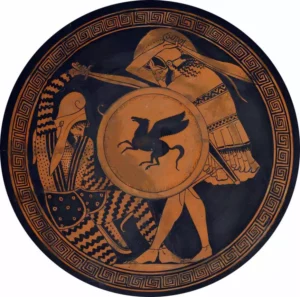
Archaic periodIn the VIII century a. C., Greece began to emerge from the Middle Ages, which followed the collapse of the Mycenaean civilization. Literacy had been lost and the Mycenaean script forgotten, but the Greeks adopted the Phoenician alphabet, modifying it to create the Greek alphabet. Objects inscribed with Phoenician script may have been available in Greece as early as the 9th century BC. C., but the earliest evidence of Greek writing comes from graffiti on Greek pottery from the mid-8th century. Greece was divided into many small autonomous communities, a pattern largely dictated by its geography: each island, valley, and plain is cut off from its neighbors by sea or mountain ranges.
Classical GreeceIn 499 a. C., the Ionian city-states under Persian rule rebelled against their tyrannical rulers supported by the Persians. Supported by troops sent from Athens and Eretria, they advanced to Sardis and burned the city before being repulsed by a Persian counterattack. The revolt continued until 494, when the rebellious Ionians were defeated. Darius did not forget that Athens had aided the Ionian revolt and in 490 he assembled an army to retaliate. Although greatly outnumbered, the Athenians, supported by their Plataean allies, defeated the Persian hordes at the Battle of Marathon, and the Persian fleet turned back.
Hellenistic GreeceThe Hellenistic period lasted from 323 BC. C., the end of the wars of Alexander the Great, until the annexation of Greece by the Roman Republic in 146 BC. Although the establishment of Roman rule did not break the continuity of Hellenistic society and culture, which remained essentially unchanged until the advent of Christianity, it did mark the end of Greek political independence.
Roman GreeceThe Greek peninsula came under Roman rule during the conquest of Greece in 146 BC. C. after the battle of Corinth. Macedonia became a Roman province while southern Greece came under the watch of the Macedonian prefect; however, some Greek poleis managed to maintain partial independence and avoid taxes. The Aegean islands were added to this territory in 133 BC. Athens and other Greek cities revolted in 88 BC. C. and the peninsula was crushed by the Roman general Sila. Roman civil wars further devastated the land, until Augustus organized the peninsula as the province of Achaea in 27 BC.
Origin
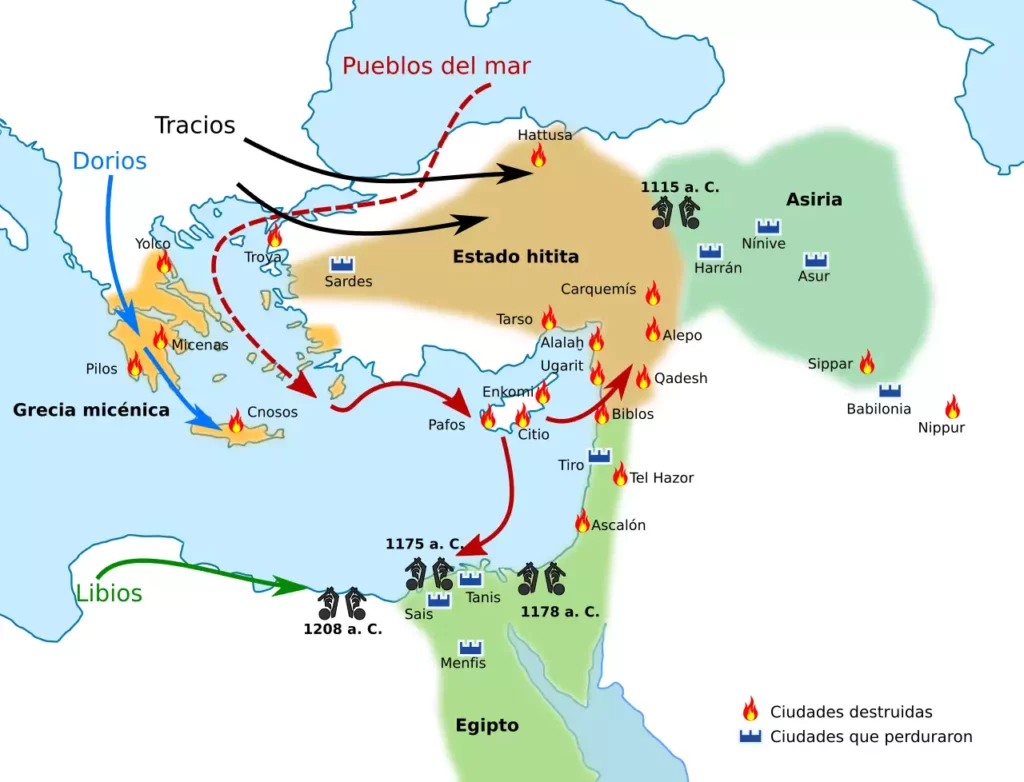
The Greek Dark Ages (c. 1100 – c. 800 BC) refers to the period of Greek history from the supposed Dorian invasion and the end of the Mycenaean civilization in the 11th century BC. C. until the emergence of the first Greek city-states in the 9th century. century before Christ and the epics of Homer and the first writings in the Greek alphabet in the eighth century before Christ. The collapse of the Mycenaean civilization coincided with the fall of several other great empires in the Near East, most notably the Hittite and the Egyptian.
The cause can be attributed to an invasion by the Sea People wielding iron weapons. When the Dorians arrived in Greece, they too were equipped with superior iron weapons, which easily dispersed the already weakened Mycenaeans. The period following these events is collectively known as the Greek Dark Ages. Kings ruled throughout this period until they were eventually replaced by an aristocracy, and later still, in some areas, an aristocracy within an aristocracy, an elite of the elite. The war changed from a focus on cavalry to a heavy emphasis on infantry. Due to its low cost of production and local availability, iron replaced bronze as the metal of choice in the manufacture of tools and weapons. Slowly, equality grew between the different sects of people, leading to the dethronement of various kings and the rise of the family. At the end of this period of stagnation, Greek civilization was engulfed in a revival that spread throughout the Greek world as far as the Black Sea and Spain. Writing was relearned from the Phoenicians and eventually spread north to Italy and Gaul.
Legacy
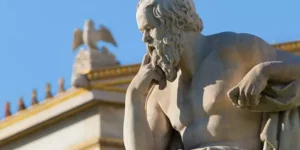
The civilization of ancient Greece has had an immense influence on language, politics, educational systems, philosophy, science, and the arts. It became the Leitkultur of the Roman Empire to the point of marginalizing native Italic traditions. As Horace said, Graecia capta ferum victorem cepit et artis / intulit agresti Latio (Epistulae 2.1.156f.)Captive Greece took its uncivilized conqueror captive and instilled his arts in rustic Latium.
Through the Roman Empire, Greek culture became central to Western culture in general. The Byzantine Empire inherited classical Hellenistic Greek culture directly, without Latin intermediation, and the preservation of classical Greek learning in the medieval Byzantine tradition further exerted a strong influence on the Slavs and later on the Islamic Golden Age and Renaissance of Western Europe. A modern revival of classical Greek learning took place in the neoclassicism movement in the 18th and 19th centuries in Europe and America.
Contenido relacionado
Joseph goebbels
Tariq ibn ziyad
Spanish colonization of America